|
|
|
Sort Order |
|
|
|
Items / Page
|
|
|
|
|
|
|
| Srl | Item |
| 1 |
ID:
130594
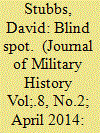

|
|
|
|
|
| Publication |
2014.
|
| Summary/Abstract |
This paper examines why the RAF maintained its view that it would be neither appropriate nor prudent to protect its bombers with long-range fighter escort until the time, late in the day, when the U.S. Army Air Forces' trials to increase the Spitfire fighter's range proved otherwise. The paper argues that some senior RAF officers, who believed that long-range fighters were unnecessary, lacked the conceptual dexterity needed after the RAF's bombers' vulnerability to single-engined fighters became apparent, and that these failings were hidden by a culture of obedience to perceived wisdom that existed within the RAF.
|
|
|
|
|
|
|
|
|
|
|
|
|
|
|
|
| 2 |
ID:
130590
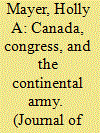

|
|
|
|
|
| Publication |
2014.
|
| Summary/Abstract |
Between 1774 and 1776 American rebels feared the British government would use French Catholic Canadians to contain their insurrection. As the empire advanced incorporation of its new subjects through the Quebec Act, the Continental Congress invited them to join its fellowship and invaded Canada to secure its cause. The invitations required that the rebels broaden definitions of civil, specifically religious, liberties, whereas enlistment of some Canadians challenged the Continental Army to practice what Congress proclaimed. Recruiting Catholic Francophone "others" by Protestant Anglophones as a strategy of war and nation building tested ideologies within the military sphere; the results reveal a precarious fit between developing public policy, military exigencies, and older biases
|
|
|
|
|
|
|
|
|
|
|
|
|
|
|
|
| 3 |
ID:
130589
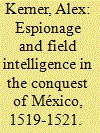

|
|
|
|
|
| Publication |
2014.
|
| Summary/Abstract |
Among the influential factors in the Spanish conquest of the Aztec empire in the sixteenth century, intelligence played a significant role. Information from field and diplomatic sources proved to have a decisive role in planning combat tactical moves as well as in the diplomatic and political contacts accompanying the military campaign. Both sides realized the importance of intelligence and used it as part of their military and diplomatic policies. This paper explores the types of intelligence sources and information-gathering systems available to the two sides in the fateful events of 1519-1521, and analyses intelligence's impact on the outcome of this momentous milestone in the New World's history.
|
|
|
|
|
|
|
|
|
|
|
|
|
|
|
|
| 4 |
ID:
130591
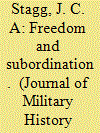

|
|
|
|
|
| Publication |
2014.
|
| Summary/Abstract |
This essay examines the general court martial case files for enlisted men in the War of 1812. The defendants were a reasonably representative cross section of the enlisted men, desertion was the most frequent offense, and mistreatment by officers was the most common motive for deserting. Most defendants proclaimed their innocence, but guilt and conviction were invariably the outcome in their trials. Officers struggled to find effective punishments. The abolition of corporal punishment by the lash in 1812 reduced the army's disciplinary options, resulting in an increasing recourse to the death penalty. The army, however, shrank from executing all the condemned.
|
|
|
|
|
|
|
|
|
|
|
|
|
|
|
|
| 5 |
ID:
130593
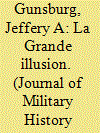

|
|
|
|
|
| Publication |
2014.
|
| Summary/Abstract |
Following the defeat of Germany in 1918, the dissolution of the Allied coalition and the gradual liberation of Germany from restrictions on its armed might, placed the neighboring Benelux countries before the dilemma of how to defend themselves against resurgent German aggression. The Netherlands and Luxemburg chose to rely on neutrality; Belgium at first flirted with the idea of joint defense with France, but from 1936, influenced among other things by the growing mechanization of warfare, embraced la grande illusion: that it could deter its neighbors from using its territory in case of a new war. Pursuance of this illusion until Germany actually attacked, together with the failure of the Netherlands and Belgium to create a joint defense, played a decisive role in the catastrophic Allied defeat of May 1940.
|
|
|
|
|
|
|
|
|
|
|
|
|
|
|
|
| 6 |
ID:
130592
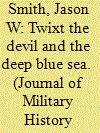

|
|
|
|
|
| Publication |
2014.
|
| Summary/Abstract |
The article examines the role of the marine environment in naval operations during the Spanish-American War era. Off Cuba, Puerto Rico, and the Philippines, naval commanders struggled with inaccurate charts in a complex marine environment. Long associated with the needs of maritime commerce, the Navy's charts and sailing directions could not account for the new strategic importance of these waters. Knowledge of the marine environment was increasingly critical to command of the sea. This article reveals ways in which marine environmental history can deepen our understanding of war at sea.
|
|
|
|
|
|
|
|
|
|
|
|
|
|
|
|
| 7 |
ID:
130596


|
|
|
|
|
| Publication |
2014.
|
| Summary/Abstract |
When Readex put its huge newspaper archive online between 2004 and 2006, it created a powerful tool for scholars to better understand the past. A case in point is the genesis of the term "War Hawk." Historians have always assumed that this term originated on the eve of the War of 1812, but a search of the Readex digital newspaper archive reveals that by then it already had been in use for at least twenty years. Like other derogatory terms-such as "Tory" and "aristocrat" or "Jacobin" and "mobocrat"-it was an established phrase in the American political lexicon. But unlike those terms, it was used by both parties whenever the opposition party talked of going to war.
|
|
|
|
|
|
|
|
|
|
|
|
|
|
|
|
| 8 |
ID:
130595


|
|
|
|
|
| Publication |
2014.
|
| Summary/Abstract |
The literature on foreign, or "transnational," war volunteering has focused overwhelmingly on the motivations and experiences of the volunteers. This approach has largely overlooked other aspects of the phenomenon such as the military and political use that host states can derive from foreign fighters. This article focuses on the enlistment of international volunteers by the Israeli armed forces in the war of 1948-49. Drawing on a combination of archival material, interviews with veterans, and secondary literature, the article assesses the relative importance of "Machal" (Israel's overseas volunteers) by comparing the role played by these foreigners with that of transnational volunteers who fought in other twentieth-century conflicts
|
|
|
|
|
|
|
|
|
|
|
|
|
|
|
|
|
|
|
|
|